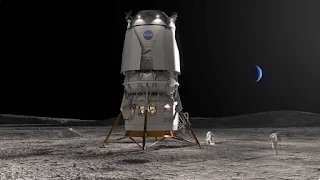Blue Origin, the space company founded by Jeff Bezos, is expected to join NASA's lunar probe program, competing with Elon Musk's SpaceX to develop a spacecraft aimed at ferrying astronauts to the lunar surface.
In recent years, space exploration has seen a flowering revival, driven in large part by the ambition and resources of visionary entrepreneurs. Two of the leading figures in this new era of the space race are Jeff Bezos, founder of Amazon and his space company Blue Origin, and Elon Musk, CEO of Tesla and his space company, SpaceX. X" (SpaceX).
And with their space companies, these billionaires have set their sights on the moon, and competition between them has been fueled by NASA's lunar probe initiatives that are actively seeking to return to the moon as part of the "Artemis" program, which in turn aims to establish a presence sustainable humans on the moon by 2024.
To achieve this goal, NASA is seeking partnerships with commercial space companies to develop lunar landers capable of carrying astronauts, which is where Bezos and Musk enter the picture to get people's contracts. The contracts are not only lucrative, but also bring enormous prestige, as they represent an important step towards the long-term goal of human colonization of the moon and beyond.
Bezos entry on the moon line
NASA announced Friday that Blue Origin will prepare a Blue Moon probe concept for a mission dubbed Artemis V, which is scheduled to launch by 2028. The Artemis V will be the third in a series One of the missions under NASA's moon landing program.
According to CNN, Blue Origin will develop the lunar lander, along with its partners, the contract to develop the probe, which is likely to have a total development cost of more than $7 billion. While the value of the "Blue Origin" contract is about $ 3.5 billion, according to Jim Frye, NASA's assistant official for Exploration Systems Development.
In a related context, said NASA Administrator Bill Nelson: "We want to establish a permanent presence on the moon, and we want to make sure that we have constant access to the moon." "With this in mind, Blue Origin itself contributes more than 50% of the total effort, not only to get to this mission but to ensure continuity."
Where is Musk from this competition?
SpaceX won the first contract to land on the moon - at a value of $ 2.9 billion - in April 2021, as the company was established to develop a version of the Starship spacecraft for NASA's Artemis III mission, which is expected Launched early in 2025, it will blast off to the Moon empty at first before meeting up with NASA's Orion capsule, which is intended to carry astronauts into lunar orbit.
On the subsequent Artemis IV mission, Starship will join Gateway, a space station that will be designed to orbit the Moon.
It's not clear if NASA and SpaceX will stick to the deadline, especially after Starship exploded last month after its inaugural test launch attempt. Starship is a giant rocket and spacecraft system designed to operate on its own.
In contrast, Blue Origin, which in 2021 sued the US government, arguing that NASA unfairly favors SpaceX, plans to develop a lunar lander similar to the one used in the Apollo missions.
Despite the court ruling against Bezos, NASA's announcement on Friday marked a drastic change to the program, officially adding a second lunar landing provider to compete with SpaceX on missions beyond Artemis V.
Tough competition
The competition between Bezos and Musk is driven by their shared determination to push the boundaries of space exploration. Both are known for their relentless pursuit of ambitious goals and their willingness to invest large sums of their wealth in their space projects. Their companies have made significant advances in reusable rocket technology, lowered the cost of space travel, and opened up new possibilities for exploration.
Besides the immediate financial and reputational gains, securing NASA contracts for lunar exploration has significant long-term implications for both Blue Origin and SpaceX. The expertise and technology developed through these partnerships will put the companies at the forefront of the emerging space economy. They will gain invaluable experience with human spaceflight and lunar surface operations, which puts them in a prime position to take advantage of future opportunities such as asteroid mining, satellite deployment, and even missions to Mars.
The competition between Bezos and Musk goes beyond mere commercial rivalry, as both believe that space exploration and colonization are crucial to the long-term survival and progress of our species. By vying for dominance in the lunar arena, they are pushing the boundaries of what is possible and inspiring a new generation of scientists, engineers and dreamers to pursue their aspirations in space.
And as NASA's lunar probe initiatives continue to emerge, the competition between Bezos and Musk will undoubtedly intensify for supremacy in the race to conquer the moon, whether through legal battles, technological breakthroughs, or otherwise. But no matter the outcome, their rivalry drives humanity's access to the cosmos, ensuring that the future of space exploration remains as exciting as ever.
Tags:
science





